Denunciation and Disruption: The Vision That Drives Occupy Wall Street
The occupiers have made it known in a most disrespectful manner that the parasite class is not welcome anymore. That’s a good start.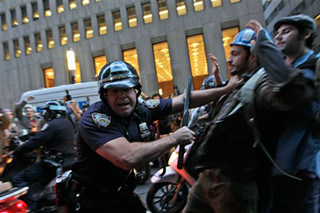
It’s 4:45 p.m. on Saturday, Oct. 15, the day Occupy Wall Street went global. The march in Manhattan is twin pronged on 6th Avenue, several blocks long on the east and west sidewalks of the street. It flows as juggernautish and loud and flashing as a flood in a canyon. The police don’t know what to do except keep it on the sidewalk, barricade it off the street with a line of scooters and hundreds of foot cops and dozens of cop vans directed by the dreaded White Shirts. These latter are the captains, the field commanders, feared because in the five weeks the occupiers have been at Zuccotti Park, clawing into the financial district with no intention of departure, the White Shirts have done the most cawing into bullhorns, have seemed the most pissed off about the occupation, and have shown the most willingness to bust heads and punch kids and break out the mace and the pepper spray when faced with the threat of young women.
I get swept in the boiling mass on the east sidewalk next to a man in a white linen suit coat who chews on a cigar and is chiding the cops mercilessly. “What’s next, officers? How about planting season? Time to plant drugs on these people!”
“Keep tawkin,” says a detective.
“Randy Credico,” says the man in the linen suit, turning to me. “Activist, political comedian. Ran against Chuck Schumer in 2010.” A little guy, spry, a cynic who likes to dress up in public as Diogenes, a New Yorker with one of those sinewy New York accents. We shake hands. Then the drums are upon us, the banners — “Revolt” and “Generation Revolution” and “Wall Street: The Enemy of Humanity” — and the shouting: “We! Are! The 99 percent!”
The goal today is the convergence at Times Square, where it’s said 20,000 people are already waiting.
The goal tomorrow is the toppling of the 1 percenters — the Wall Streeters, the socially useless financiers, the bankers, the hedge funders, the derivatives traders, the corporate lawyers, the big-moneyed class that, in a more muscular age of progressivism, say, a hundred years ago, would be denounced as the parasite class. The parasites in New York, at last count in 2007, took for themselves close to 45 percent of all income in the city. Forty-five percent of all income going to roughly 34,000 households. The occupiers know their addresses, and in recent weeks have visited their doors in a most disrespectful manner to make known that the parasite class is not welcome anymore.
That’s a good start, the act of shaming and ridicule. How the toppling of the parasites is functionally to be accomplished, the machinations needed to smash their power and put them on a rocket ship to an airless planet, is as yet unknown. Nor does anyone here much care that it’s unknown. What matters on a day like this is morale, and to find morale means to gather en masse to make a mess of the normal state of affairs — the politics of disruption for its own sake. The Occupy Wall Street movement has collaborators in dozens of cities — Occupy Chicago and Occupy Los Angeles and Occupy Seattle — but it is the occupation in New York, the most regressive city in the nation, to which Occupiers nationwide look for inspiration. The enemy is nested in New York, and it is here the battle is to be joined.
On the west side of 6th Avenue, a dashingly handsome black man in a white do-rag and corduroy jacket leads the flood. I find out later his name is Hero Vincent, a New Yorker, just 21 but seeming much older, a veteran at disruption. He gestures to his counterpart on the east sidewalk in an array of cryptic hand signals. Together they stop the march — who knows why, perhaps for the hell of it, perhaps to show they can. The police are hysterical in their bullhorns: “Keep moving! Keep moving!” No one moves. Vincent savors the stoppage, smiles gigantically — a flashing toothy calming smile you can see a hundred feet away — and raises his fist, which stretches out pointing north. The flood is back on.
Now 28th Street, 29th, 34th, Herald Square and Macy’s — the parting of the shoppers. They gawk, they wonder, some of them cry out in support, some are gripping grab bags of new-bought junk thinking the mob will rob them. The occupiers answer: “Join us, brothers and sisters! Join us! YOU. ARE. THE 99 PERCENT!”
But they don’t join.
A great moaning suddenly fills the air — Hero Vincent has been snatched by the White Shirts. The occupiers turn as one and chant: “Let him go! Let him go!”
In a flash, Credico has broken through the scooter barricade, is across the street, dashing among the White Shirts, his face grotesquely twisted, the cigar gripped tight, as if it would scatter all authority, the officers surrounding him, jabbing and pushing at him though he’s done nothing but speak his mind and wave the cigar. He’s demanding the reason for Vincent’s arrest. (I find Vincent later that night, at Zuccotti Park, and he tells me he was arrested for “obstructing traffic.”)Credico is right up in the cops’ faces and they’re knocking him around. “Get your fuckin’ hands offa me,” he’s screaming. “Get your fuckin’ — ” He disappears in a wall of cop, and I’m figuring he’s a goner, headed to the same van where Vincent was hauled, still smiling that tall smile.
Instantly, another leader steps in where Vincent stood, holding up the same secret messages with a raised fist and fingers gesturing. And the march floods always north.
Somehow Credico is free. We’re moving side by side faster now, almost at a jog. Times Square is not far. He’s been with the occupation for 19 days, not sleeping there but joining in the general assemblies to plan, to make friends, to make noise, to march. “And I still can’t figure it out. I mean, who the leader is.”
At 46th between 6th and 7th, the beast is unleashed — the cops can’t keep it from the streets. “Whose streets, our streets,” goes the chant, and I find myself yelling it. A catcalling jubilation, hundreds of people running, not colliding, orderly in their own fashion. The flood surges onto Times Square at 5:30 p.m. A long standoff at 7th Avenue and 46th ensues as the protesters are corralled in barricades. The cavalry is called in, cops in leather on horses stamping. The protesters push against the barricades, the cops respond with flanks of horse flesh, slamming them back. A young Hispanic man is cracked across the face with a billy club, the bone broken above his left eye, the eye turning bloodshot. His hands are shaking, he’s not talking, he’s in shock. He’s carried into a trinket store where the clerk demands that he leave. Someone buys a toy Statue of Liberty and the clerk changes his mind and offers bandages that fill with blood.
An older man, nattily dressed in a blue dinner jacket with gold buttons over a white tennis sweater, his gray hair cut razor short, says he was the guy who carried the bloody-eyed kid into the store and who bought the Liberty to stave off the angry clerk and who later got in a cab and rushed the kid to the nearest hospital. He says his name is Ken and he runs a business consulting firm of some sort. He wouldn’t tell me more — didn’t seem to trust me with more. When he spoke, he sounded out of his mind with rage. “This is Nazi Germany, 1938,” he’s telling me. He’s talking about the execution of the members of the Federal Reserve who have “hijacked our money system” and are “traitors to the Constitution.” “We’re not fucking around anymore,” Ken says. “We’re debt slaves. Let’s take our country back. Ninety-nine percent of the people in this country are hardworking. Why are we letting the 1 percent fuck it up for the rest of us?” Disgusted, spitting the words.
A woman nearby is crying. Her name is Shannone Rhea, 40, a brunette, burly, tough-looking. “They’re fucking trampling people with the horses,” she’s saying. She cuts the sobbing and gets serious. “Not sure how many people were hurt. It was sick.” She’s got tattoos on her arms, goggles around her neck — for mace, for tear gas, for whatever violence was to come — and says she has a daughter, 19, somewhere out there facing off with the cops. “My daughter,” she says. “She keeps getting arrested. She’s been arrested four weekends in a row. Resisting arrest. Disorderly conduct.” Proud but also terrified saying it. “God, I hope she’s OK. I don’t know where she is, she’s not answering her phone.”
Rhea lives in Islip, N.Y., in the suburbs of Long Island, a stay-at-home mom. She lives with her in-laws. “You know, I don’t wanna live with my in-laws — I mean, they’re great, but I want my own house so bad. We can’t even find a place to rent. My credit is shot and I’ve got student loans and medical debt. My husband works. Hard. A heavy-equipment mechanic. Repairs highway construction vehicles.”
Rhea was up at the frontline on the barricade when the cavalry pushed in. She was knocked to the ground. The horses were almost atop her. She thought she would be crushed.
A giant of a man, a former fire department grunt for 10 years with ladder 149 — his name is Joe Hunt — is haranguing a line of police near where the horses had been brought in. A wild, ravaged, cracking sound in his voice. He’s maybe 6 feet 6 inches tall, and the cops regard him fearfully. “Stand up for the brothers! Stand up for the brothers!” he’s screaming. His voice is anguished, going hoarse. He doesn’t stop. “Why are you protecting Bloomberg? Why are you protecting his people? They’re robbing you, too! Stand up for the brothers! Stand up for the brothers!” Cameras converge on all sides — the media locusts scrumming, flashbulbing, waiting for — wanting — blood. I ask Hunt why he’s here. “As Marcus Aurelius says: ‘Reflect the light to the next generation.’ ”I meet a man named William G. Bores, who has brought his daughter Anna, a wide-eyed ninth-grader. Bores is a union man, an executive board representative of the National Association of Broadcast Employees and Technicians. “The companies are outta hand,” he tells me. “They’ve won. We’re down to 272 members from 1,200 when I started 25 years ago. We’re working now 10 months without a contract. The first time I went down to Zuccotti Park, I wanted to kiss these kids.” I ask him about the cops. “I’m the son of a city cop — my dad was 20 years at the two-five in East Harlem in the ’60s and ’70s. I’m the brother of a state cop. The godson of a major crimes detective.” Bores has nothing against cops. What he doesn’t like is cops going after the wrong people. His son, who is studying labor relations at Cornell, slept at Z Park for days. “He got his start when he was 8 years old, when I was on the picket line against Disney, locked out. He was leafleting and Disney nearly got him arrested.” Bores picks up a bucket, a makeshift drum, and Anna now plays, banging away.
I turn for a moment, and when I look back, plainclothesmen are shooting photographs of protesters — gathering face-databases, who knows — and Bores decides to shoot photos of the cops shooting photos. This is not well received.
An undercover pushes him, cursing: “Get the fuck outta my way.”
Bores, a tall man, fit, stands his ground. “Come on,” says the undercover, baiting him. “Come on.”
“You don’t push me,” Bores says — but he keeps his hands behind his back to show he will not engage in hurt. “I didn’t touch you, you don’t touch me.”
“Come on,” says the undercover, beckoning with a finger. Bores stares the cop down, unmoving. The crowd surrounds them, the cameras flashing.
Down the block on 46th Street, a big black Marine, Sgt. Shamar Thomas, in fatigues, with his medals from 14 months in Iraq displayed, confronts 30 cops, who stand stone faced, not knowing how to deal with the unhinged veteran. “It’s not a war zone,” Thomas is yowling, sounding like a madman. “These are unarmed people,” Thomas screams. “It doesn’t make you tough to hurt these people. Leave these people alone! These are U.S. citizens! U.S. citizens! My mom did a year in Iraq, my father was in Afghanistan. If you want to kill and hurt people, go to Iraq.”
“Just walk down the street please,” says a White Shirt in a megaphone, but Thomas doesn’t move.
“I can’t speak, y’all wanna shut me up! There’s no honor in this. How do you sleep at night? There is no honor in this! No honor! No honor!”
Bores watches as Thomas stands down the cops, and then the two of them hug.
Later I learn that at roughly this same juncture Credico, a block away in Times Square, is attacked by the cops and beaten badly and taken away in cuffs, looking scared. He says it was at the hands of one of the White Shirts he had mocked all the way up 6th Avenue.
Filmmaker Michael Moore now passes by at 46th and 7th, schlumpy and shambling, as fat in person as he is on film, trailed by what appears to be a personal videographer to capture his every fart. Most of the crowd ignores him. Moore doesn’t matter here. The VIPs don’t matter here. (A few days later, at Zuccotti Park, Jesse Jackson showed up, and so did Congressman Charlie Rangel. It was a fine photo op for Jackson and his entourage. Most of the kids in Z Park shrugged. They could give a shit, and they wanted him to go away. When Rangel made his appearance, he “looked like a robot,” says Jeff Smith, 41, who was formerly in advertising and public relations — he concluded his business was “pure evil” — and has been nose-leading the media for the occupation. “Or an alien. Or on safari. He seemed to need to be led around, waiting to be approached and have his hand pumped.”)
At 46th and 7th, the people’s microphone cues up. A simple human technique that works like this: Someone wishes to speak, they cry, “Mic check!” And the crowd responds, “Mic check!” The speaker intones, barely audible, and the crowd repeats the words like a Greek chorus, the effect being that the speech is made by all, the speaker only as powerful as his language.
Above us, the vast inhuman billboards of Times Square, the extravaganzas of epileptic light — the looney-tune advertisements (a girl parades in underwear, a girl laughs and laughs because she’s gotten the holy grail of underwear); the Bank of America sign, its blood-red rich neon; the Dow’s ticker its usual gibberish of numbers that mean nothing for this crowd. Then, a news ticker: “Occupy Wall Street goes global.” The occupation has marched in 1,500 cities across the planet, and in 100 U.S. cities. Hundreds of thousands of people united against world corporatocracy.
A voice, small and cracking, begins: “Mic check!” A roared response, the crowd ready, the billboards and the idiot light shows receding, made irrelevant: “We want to salute — ”
“We want to salute!” answers the people’s mic.
“Our brothers and sisters — ”
“Our brothers and sisters!”“Across the world –”
“Across the world!”
“This — ”
“This!”
“Is only the beginning!”
The beauty in all this is that there is no mere demand, not a sliver of legislation the occupiers want passed or special interest they want satisfied — nothing by which to be hemmed in ideologically or politically. The habit in the mainstream media to date has been to bitch and moan that the protesters don’t know what they want, or won’t say what they want, won’t offer up the pre-masticated bullet-point list easily consumed by reporters suckled on press releases and toilet trained for TV. An ex-Marine named Brian Phillips, 25, who traveled to Zuccotti Park from Washington state, tells me what he wants. “We want to start a new way of living,” Phillips says. “We want to start a new society. We want to destroy a system that benefits only the 1 percenters. It’s not working for us. It’s putting us in poverty. We say: ‘No more making laws that benefit corporations or banks.’ ”
The norm in the political economy of the United States is that the corporations and the banks run things and we all suck it up and smile. With the rise of the occupation, the disruption of this degraded normalcy of affairs is the message and the meaning. The message is that the future of American democracy is not in casting the meaningless vote in the two-party shell game, nor in lobbying over fine dinners, nor in writing letters to robots like Charlie Rangel, nor merely in Facebooking and Twittering one’s dissent. The future lies in people gathered in the streets in solidarity and making trouble.
Your support matters…Independent journalism is under threat and overshadowed by heavily funded mainstream media.
You can help level the playing field. Become a member.
Your tax-deductible contribution keeps us digging beneath the headlines to give you thought-provoking, investigative reporting and analysis that unearths what's really happening- without compromise.
Give today to support our courageous, independent journalists.
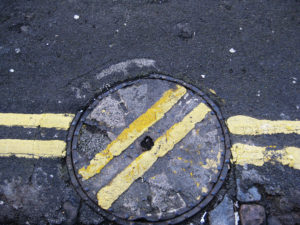
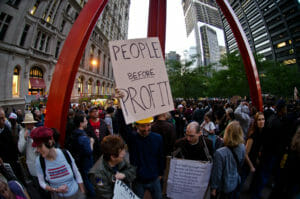


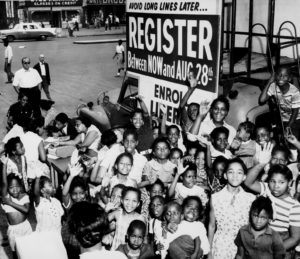
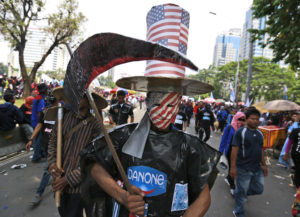
You need to be a supporter to comment.
There are currently no responses to this article.
Be the first to respond.